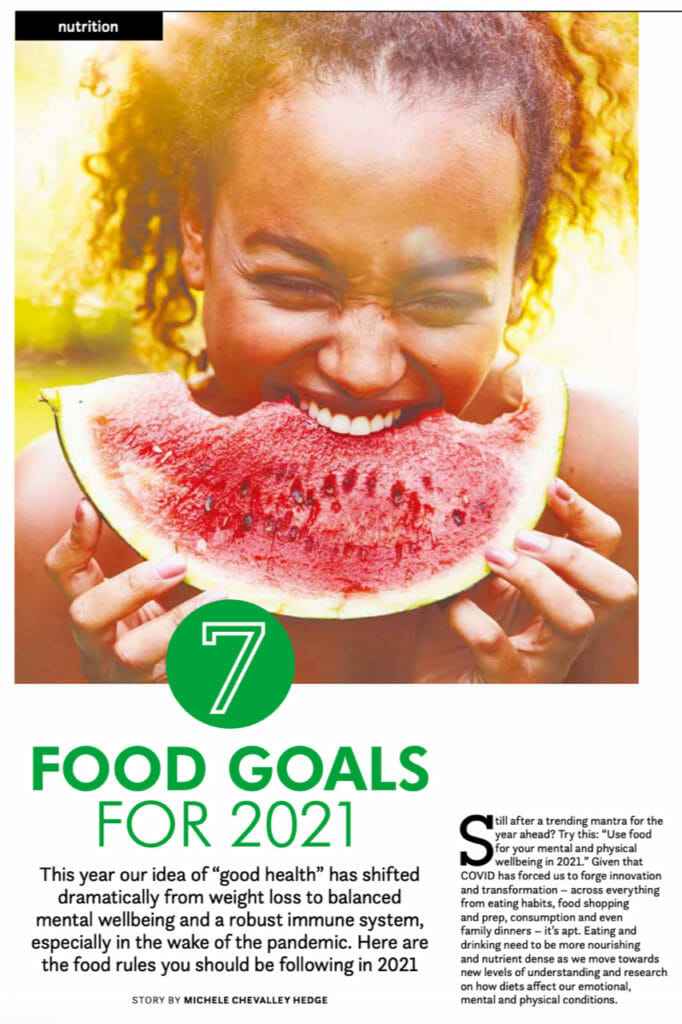Seven Food Goals for 2021

By Michele Chevalley Hedge Body & Soul Jan 2021
“Use food for your mental and physical wellbeing in 2021.” Let this be this year’s trending mantra. COVID has forged innovation and transformation including eating habits, food shopping, food prep, consumption and even family dinners. Eating and drinking will be more nourishing and nutrient dense, as we move towards new levels of understanding and research how diets affect our mental, emotional and physical wellbeing.
1.Eat your greens
The plant-based boom will continue and cauliflower pizza will be as popular as Meghan Markle. Whether it be plant based meat, seafood, dairy or eggs this movement is stemming from emerging research on a plant-based diet lowering inflammation, which is a key predator in depression and immune function. There will be less focus on vegetarians and more focus on flexitarian and a holistic balance on plant-based food. Choose vegetables for 30-50 % of meal.
2.Food for your mood (and mind)
There are 12 nutrients which relate to the prevention and treatment of depressive disorders: Folate, iron, EPA, DHA, magnesium, potassium, selenium, thiamine, vitamin A, B6, B12, C, and zinc. Consciously think about incorporating these foods into your daily or weekly meal: oysters and mussels, various seafoods, and organ meats, leafy greens, lettuces, capsicums, and cruciferous vegetables like broccoli, cauliflower, brussel sprouts and kale.
3. Take a “biotic” food every day
We are all aware of pre and probiotics for optimal gut heath and now there is a new sheriff in town – the postbiotic. All three of these ‘biotics’ not only play into our immune system but our ‘gut – brain’ mental wellbeing connection too. This new player is an end product of the fermentation process and its benefit is that it doesn’t need to be alive. Sourdough bread will reap the benefits of postbiotics and perhaps is one of the reasons why IBS and FODMAP suffers feel better eating this bread.
- Boost your immune system
COVID prevention will strengthen the need for rigorous research on vitamins and nutrients. According to Harvard University, currently leading the research is zinc, Vitamin C and the ‘most promising’ Vitamin D. Whilst supplement sales will increase, so will foods which are abundant in these nutrients. Along with sunlight being worshiped for Vitamin D, so will mushrooms, salmon and egg yolks. Push over your chips and get infatuated with ‘shroom snacking.
- Add some spice
As we move towards health-conscious eating, we will consume more whole food that is unpacked and unprocessed. This begins to shrink our shopping cart and could impact your variety of taste. A way to overcome this and make your taste buds happy is the use of spices and sauces. Not only can they be antioxidant rich, full of photochemical and micronutrients, they can turn healthy ‘good for us’, possibly boring food into tasty delights. Think colour, flavour, fragrance without adding additives, preservatives, sugar or excess salt. Jalapeno jam, Nutty pesto, spicy mayonnaise, wasabi horseradish mustards, turmeric salad dressings, and chilli-everything will become the new ‘salt and pepper’ replacement.
- Drink less alcohol
Drinking with a consciousness is an admirable goal. Let’s opt for a healthy lifestyle but not compromise on socialising, especially as we come out of COVID restrictions. When considering what to drink people are looking for low sugar, low preservatives, sulphites, and minimal innervation. With this in mind, hard seltzers and hard kombuchas will continue to be popular due to their fruit taste and none of the bloat and bitterness of beer. Natural wines meet the needs of many with low sulphur, low chemicals, and often sustainable farming practices. Tick, tick, tick.
- All hail honey
Make this sweet amber one of your nutritional and physical goals for this year. Honey contains lots of micronutrients, amino acids, phenol antioxidants but there is more to honey – it is being used as a therapeutic and beauty agent due to its anti-microbial, anti-inflammatory, anti-viral research. From sore throats, dry eyes, and blepharitis, to adding a bit of joy to one’s tea, we should all hail the honey.
Nutritionist Michele Chevalley Hedge, is the Sydney-based author of Eat, Drink and Still Shrinks… a joyful guide to living.
Categories
- A Healthy View (507)
- Breakfast Recipes (22)
- Chicken Dinner Recipes (29)
- Chilli Recipes (5)
- Christmas Recipes (14)
- Curry Recipes (8)
- Dessert Recipes (20)
- Dinner Recipes (113)
- Easter Recipes (9)
- Energy & Vitality (4)
- Free Recipes (232)
- Gut Health (12)
- Hormone Health (19)
- Media (86)
- Mental Health (30)
- Mexican Recipes (11)
- Nutrition (207)
- Productivity (6)
- Salad Recipes (9)
- Sauce & Dip Recipes (12)
- Seafood Recipes (12)
- Sleep (7)
- Soup Recipes (12)
- Snack Recipes (56)
- Stress (2)
- Sugar (14)
- Weight Loss (37)
- Workplace Wellbeing (27)
- Uncategorised (1)
- Brain Health (3)
- energy (1)
- calories (1)
Ready to take the next step?
Explore our full range of wellbeing courses and start your journey today.

Michele Chevalley Hedge is a qualified Nutritional Medicine Practitioner, speaker, and best-selling author has delivered 600+ keynotes for leading global brands, including Microsoft, Accenture, American Express, Apple, ANZ, CBRE, the Australian Government, and more.
Michele’s nutrition retreats, wellness courses, books, articles, and corporate health programs are backed by peer-reviewed research on workplace well-being, nutrition, stress, and mental health. A regular guest on Channel 7, Sunrise, and The Today Show and contributor to The Sydney Morning Herald, Body & Soul, and The Daily Mail, Michele is also an Ambassador for Cure Cancer and the Heart Research Institute.



0 comments
Leave a comment
Please log in or register to post a comment